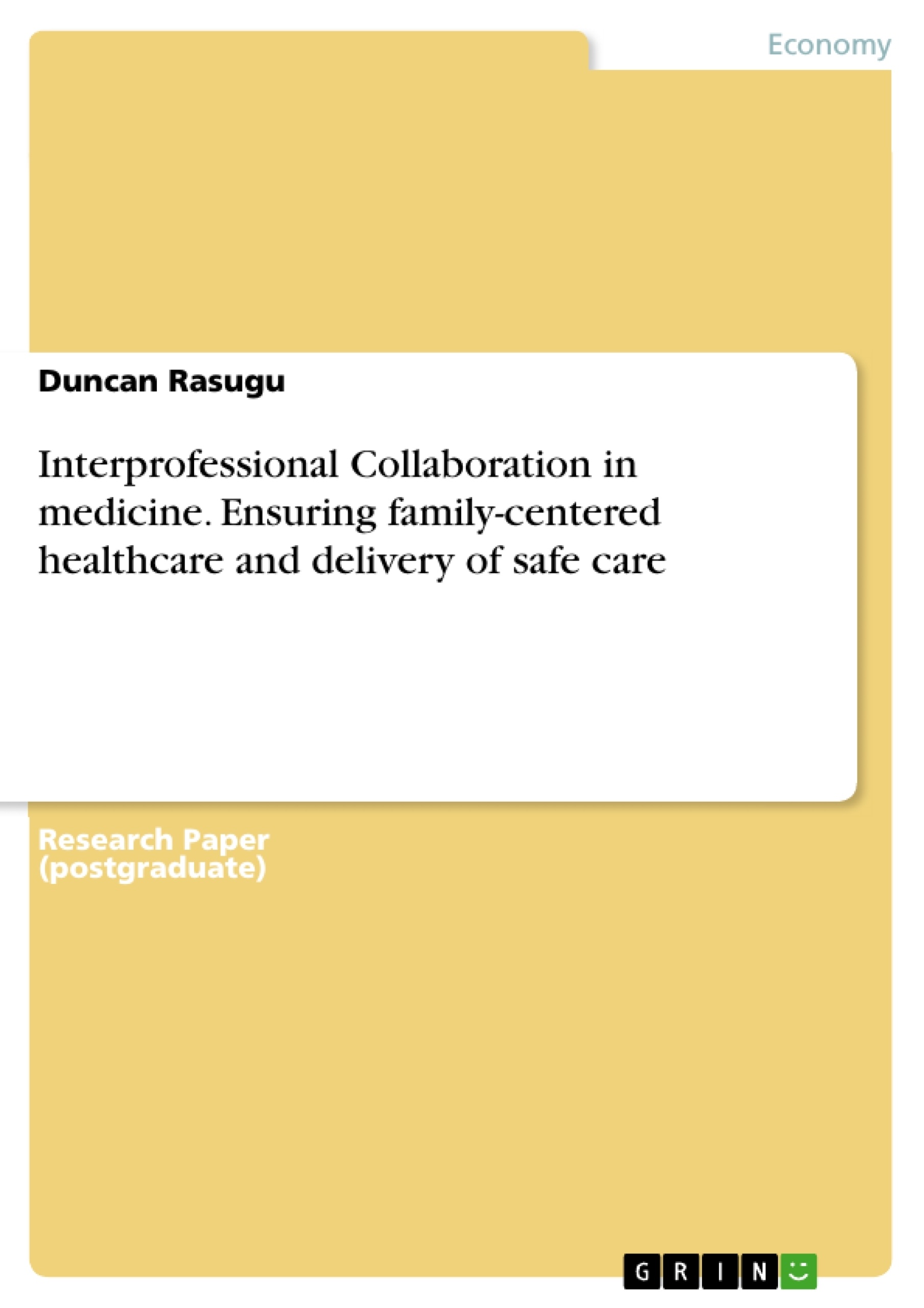Interprofessional collaboration (IPC) has been one of the most significant practice in medicine. According to the Institute of Medicine, the collaboration focuses on creating teamwork among medical practitioners to ensure developed healthcare. The institute further asserts that the establishment of these team focuses on facilitating improved healthcare for patients especially with regards to observation and diagnosis. Besides, the practice gears towards establishing a didactic program that is community-based using the interprofessional simulation experience. The Institute of Medicine is responsible for providing the guidelines for the collaboration.
The research work will focus on creating a better understanding of the context of IPC in medicine as well as its implications in the field of medicine. Besides, the study will also establish the role IPC plays in ensuring family-centered healthcare and delivery of safe care. Also, the paper will also address the purpose of the practice of medicine together with the competencies of the interprofessional collaboration concerning medical practices.
Inhaltsverzeichnis (Table of Contents)
- Introduction
- Definition and implications of interprofessional collaboration
- Role of interprofessional collaboration in delivering safe patient and family centered care
- Purpose of interprofessional collaboration
- Competencies of interprofessional collaboration
- Ethics/Values for IPC
- Roles and responsibilities
- Interprofessional communication
- Teams and Teamwork
- How a nurse may help in delivery of care through IPC
Zielsetzung und Themenschwerpunkte (Objectives and Key Themes)
This research focuses on understanding the context and implications of interprofessional collaboration (IPC) in medicine, particularly its role in delivering safe and family-centered healthcare. The study examines how IPC contributes to improved patient outcomes, resource utilization, and the establishment of community-based didactic programs.
- The importance of interprofessional collaboration in healthcare
- The role of IPC in delivering safe and family-centered care
- The competencies required for effective interprofessional collaboration
- The benefits of IPC for patients, families, and healthcare providers
- The role of nurses in facilitating the adoption of IPC
Zusammenfassung der Kapitel (Chapter Summaries)
- Introduction: This chapter introduces the concept of interprofessional collaboration (IPC) and its significance in medicine. It highlights the role of IPC in improving patient outcomes, promoting teamwork, and facilitating a community-based approach to healthcare.
- Definition and implications of interprofessional collaboration: This chapter defines IPC as a collaborative approach involving healthcare workers, patients, and families to make shared decisions regarding health and social issues. It explores the implications of IPC for communication, decision-making, and achieving shared goals.
- Role of interprofessional collaboration in delivering safe patient and family centered care: This chapter discusses the benefits of IPC in delivering safe patient and family-centered care. It emphasizes how IPC contributes to improved outcomes, efficient resource utilization, and proactive healthcare strategies.
- Purpose of interprofessional collaboration: This chapter explores the purpose of IPC, which is to provide a collaborative practice that focuses on patients and their families. It highlights the role of IPC in creating more effective healthcare systems and convenient patient care settings.
- Competencies of interprofessional collaboration: This chapter outlines the four core competencies of interprofessional collaboration, including ethics and values, roles and responsibilities, communication, and teams and teamwork. It explores the importance of each competency in fostering effective collaboration.
- How a nurse may help in delivery of care through IPC: This chapter discusses the role of nurses in promoting the adoption of IPC in healthcare organizations. It emphasizes the ability of nurses to collect data on errors and communication failures, leading to the implementation of IPC practices.
Schlüsselwörter (Keywords)
Key terms and concepts explored in this text include interprofessional collaboration (IPC), patient-centered care, family-centered care, communication, teamwork, healthcare ethics, shared decision-making, and professional roles and responsibilities. The text also examines the benefits of IPC for healthcare outcomes, resource utilization, and community-based healthcare delivery.
Frequently Asked Questions
What is Interprofessional Collaboration (IPC) in medicine?
IPC is a collaborative approach where healthcare workers from different professional backgrounds, along with patients and families, work together to make shared decisions and provide high-quality care.
How does IPC improve patient safety?
By fostering teamwork and effective communication, IPC reduces errors, improves diagnosis and observation, and ensures that care is proactive and family-centered.
What are the core competencies for effective IPC?
The four core competencies are: Ethics and Values for interprofessional practice, understanding Roles and Responsibilities, Interprofessional Communication, and Teamwork.
What is the role of a nurse in Interprofessional Collaboration?
Nurses play a vital role by collecting data on communication failures and errors, facilitating the adoption of IPC practices within healthcare organizations, and ensuring safe patient delivery.
Which organization provides guidelines for IPC?
The Institute of Medicine is responsible for providing the guidelines and framework for the collaboration among medical practitioners.
- Citation du texte
- Dr. Duncan Rasugu (Auteur), 2016, Interprofessional Collaboration in medicine. Ensuring family-centered healthcare and delivery of safe care, Munich, GRIN Verlag, https://www.grin.com/document/355534



